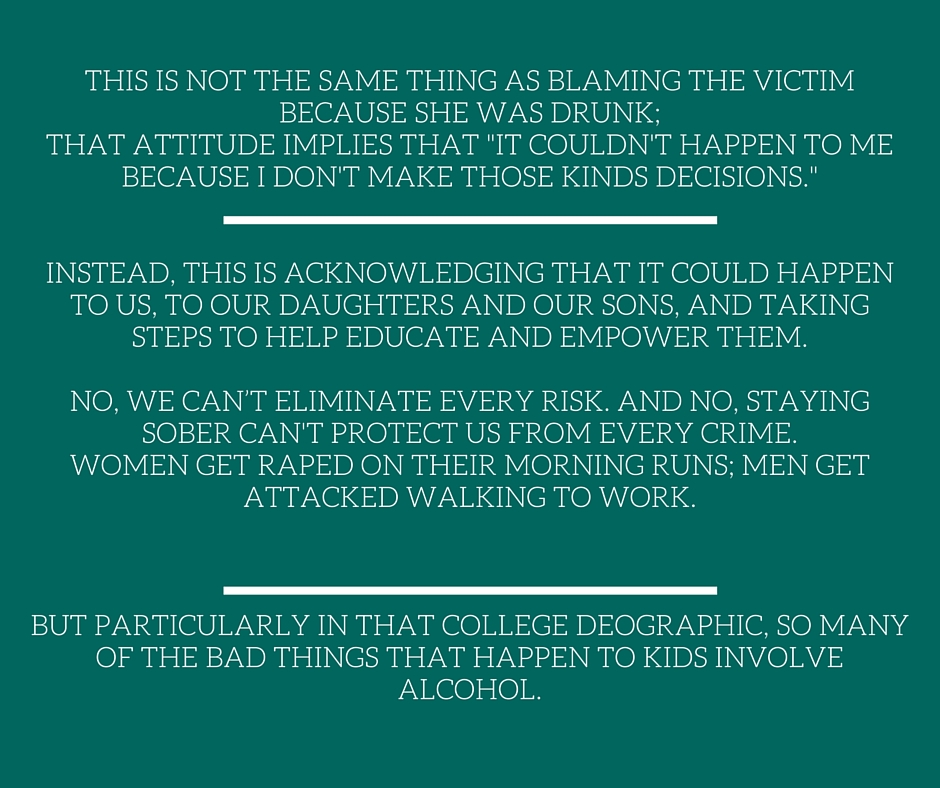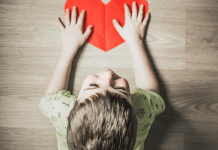 Let me start by making three things very clear: One, Brock Allen Turner is a rapist without remorse. I am as horrified as you are by his behavior and the subsequent gross failure of our justice system. Two, the young woman he assaulted is not in any way to blame for what happened to her. There is only one person culpable in a rape, and that is the rapist. And three, I am not anti-alcohol. I have a wine rack in my kitchen and a few beers in the fridge. Please put away your pitchforks.
Let me start by making three things very clear: One, Brock Allen Turner is a rapist without remorse. I am as horrified as you are by his behavior and the subsequent gross failure of our justice system. Two, the young woman he assaulted is not in any way to blame for what happened to her. There is only one person culpable in a rape, and that is the rapist. And three, I am not anti-alcohol. I have a wine rack in my kitchen and a few beers in the fridge. Please put away your pitchforks.
However.
After almost fifteen years of working with teens, there’s a dialogue that I hope families are having with their children as a result of Brock Turner’s crime, and it isn’t about blame. It’s about alcohol, and what it means to make decisions to protect yourself. There is an opportunity here, to begin some tough conversations with your kids.
There will always be Brock Turners in the world. Just like there will always be people who break into houses, and people who shatter car windows to get whatever looks good on the inside. The person whose house is burglarized is never accused of being at fault because obviously the thief carries all the blame. But we still take steps to protect ourselves, right? We lock our doors, install alarm systems, look for homes in areas with low-crime-rates, and make sure not to leave our valuables in the car.
We do everything we can to limit risk, and that’s smart.
So let’s talk about drinking, specifically drinking the way college students think it needs to be done: lots of alcohol in a short time, with the express purpose of getting very, very drunk. What happens when a very, very drunk person crosses paths with a man like Brock Turner? Well, he or she is effectively, dependent on someone else to step up and do the right thing. Only in Disney movies is it romantic to be in danger; in real life, it is just plain dangerous. In fact, on a night of heavy drinking, there’s a lot more than Brock Turner to worry about. Obviously, there’s the physical effects of alcohol poisoning, and the risk of being caught if you’re underage. But think about the other hazards you encounter in day to day life? How you can protect yourself from anything if you’re ten beers in? You can’t.
Several years after I graduated from college, there was a terrible house fire in an off-campus home. Several students died, just days short of their graduations. The occupants of the house had been hosting a party, and cigarette smoke kept setting off the smoke detectors, so they took out the batteries. Problem solved, right? And at some point, someone had the great idea to put out his or her cigarette in a couch cushion. Several young people consumed so much that they went to sleep in a house that wasn’t theirs, and when the fire started and the disabled smoke detectors failed to blare, they didn’t wake up from their deep, alcohol-fueled sleep. In the chaos, no one in the house thought to look for them…did anyone even know they were there? In the weeks following the fire, media attention focused on the condition of off-campus housing, not the drinking and decision-making. I couldn’t stop thinking about those mothers, their anguish, and the what-if game they must have played a thousand times. What if the kids who died in that fire only had a beer or two and gone home? How would life have been different?
People who are drunk do not have the wherewithal to make the best choices regarding really anything… behavior, conversation, or safety. They are easy targets for criminals and accidents because they don’t have the faculties to protect themselves. (This doesn’t mean they deserve to have bad things happen, it just means the door is left a more open for it to.) It isn’t wise to depend on friends for protection, especially if they are drinking, too. I mean, where were the friends of the young woman raped behind a dumpster? Maybe they thought she was safe there. Maybe they didn’t notice she was gone. And the danger isn’t limited to girls; our boys need to be aware and vigilant, too.
Please don’t make the mistake of thinking this is obvious information to your teens. In fourteen years of teaching, I’ve had this conversation with my high school students over and over again. Drinking and driving is bad, yes. They all get that. But they think if they’re drinking in someone’s home, or if they’re surrounded by friends, that they’ll totally be OK. They might. But talk to the parents of the teenage girl who died of alcohol poisoning on the floor of her friend’s bathroom…while her friend’s parents slept soundly in another room. She wasn’t safe. Those students at my college weren’t safe. And Brock Turner’s victim wasn’t safe.
Teens also think that they are supposed to drink. Heavily. That it is normal. That they should drink even if they don’t like the taste because that’s what teenagers do. They think drinking is their ticket to popularity. To relationships. To everything that matters to teens. They think that because our culture says so. Their parents agree because our culture says they should.
Kids don’t think about about mitigating risk. They don’t think about what it means to use alcohol responsibly, unless an adult takes the time to have that conversation. (Seriously, there are teenagers who will be shocked if you mention drinking only one glass of wine at a time. They have no idea that people do such a thing.) As this heinous news story circulates through the internet, I hope that parents are sitting down with their kids and saying, “I don’t want you to suffer the way this young woman has suffered; let’s do everything we can to keep you safe.”
Let’s stop pretending that alcohol abuse is a rite of passage. It isn’t, but as long as we condone it, it will keep happening. And there will be more tragedies. More kids who fall out of windows and off balconies. More kids who find out from the police what happened the night before. More kids whose futures are irrevocably changed. (I’m talking about Brock Turner’s victim, not him. He cannot blame alcohol for his behavior.) Our teens are capable of making good decisions; they need adults to talk honestly about alcohol, and they need to see adults using it wisely. (And maybe choosing not to use it from time to time.)





 These are our children, folks. These are their lives.
These are our children, folks. These are their lives. 






